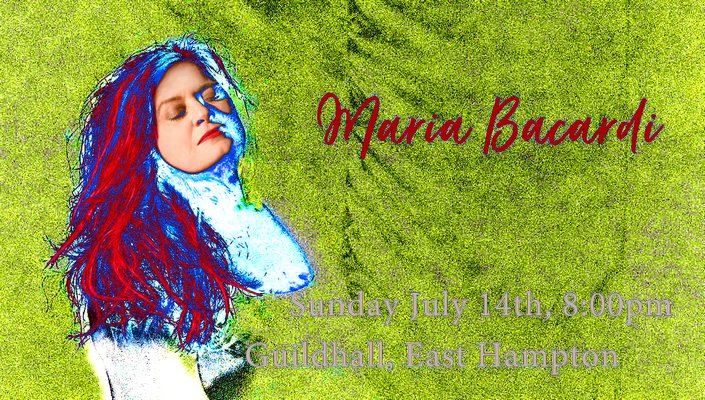
Though she was just a child, Maria Bacardi still recalls the scene in vivid detail—her mother, family and friends sitting around the kitchen table at their home in Madrid singing boleros, the emotionally laden songs of old Cuba. “I remember my mother singing them every night,” Ms. Bacardi recalled during a recent interview at her home in Springs. “All the exiles who hadn’t gone to Miami went to Madrid, and they all came to my mom’s house. I would be in my pajamas and I’d hear them singing, crying and drinking rum, and they all had an instrument—the bongos, the claves, the maracas—and I learned all those songs.”
Ms. Bacardi was 3 years old in 1961 when her family fled Cuba and the Castro regime. She says her mother packed up their entire life in just three days, making sure to bring along her guitar and albums when they set out to start their new life in Spain.
Now, Ms. Bacardi, who moved to the United States in 1977, is reinventing those same Cuban songs she heard on records and at the kitchen table for a brand-new audience. Her recently released album, “Duele,” which translates to “it hurts” in Spanish, pays tribute to the boleros of her mother’s generation but updates them by infusing the old songs with contemporary beats and English translations.
On Sunday, July 14, Ms. Bacardi and her 12-piece band, fresh from a sold-out show last winter at Joe’s Pub in Manhattan, premiere the new album at Guild Hall. The 8 p.m. concert is a benefit for Project Most, the after-school and summer learning program for families in East Hampton and Springs. It’s a cause that is near and dear to Ms. Bacardi’s heart, as her son, Liam, attended Project Most when he was a student in Springs.
“The organizers and the teachers there do the work of God. Kids can do their homework, they have dance classes, a greenhouse, and visiting artists who teach,” Ms. Bacardi said. “It really serves the community at large and is very important.”
Also important to Ms. Bacardi is bringing the music of her youth to a broader audience. While there are many different types and styles of Cuban music, she notes that boleros are the most romantic form of them all. Some songs date back 100 years or more and the heyday of the form occurred in the decades leading up to the middle of the 20th century. The Cuban bolero—which is not related to the Spanish form—originated in the city of Santiago de Cuba in the late 19th century (ironically, the same city where Ms. Bacardi’s great-grandfather founded Bacardi rum in 1862). From there, boleros spread by way of traveling musicians who earned their living by singing and playing guitar across Cuba.
“They’re wrist-slitting and heart-wrenching,” she said. “You’re supposed to dance to them very close, staying inside a small, square tile.”
The most recent boleros were written in the late 1950s. At that point, they were banned by the Castro regime, which considered them too bourgeois.
“People are writing new ballads, but not boleros, which have a very specific meter and structure,” Ms. Bacardi explained.
As a side note, also banned at the time was the music made famous by the musicians of the Buena Vista Social Club, which formed in 1996 to revive the pre-revolutionary Cuban melodies.
In creating her “neo boleros” for the new album, Ms. Bacardi teamed up with arranger and producer David Oquendo, a bolero master living in New Jersey, and Edgaro Gonzalez, a young Cuban audio engineer and hip-hop producer who came to the United States on a grant to study at Berklee College of Music in Boston. Because he grew up in a Cuba where boleros were banned, he was naturally very interested in learning more about them.
“I knew I wanted to get away from the vintagey look and sound,” Ms. Bacardi explained. “We were all in the same room to establish the proper melody. The line is meant to be sung a certain way, then Edgar would take it to his computer, sample it and give it modern beats.”
The result of the collaboration is “Duele,” an album that pays homage to the traditional bolero while offering updates that bring the songs into the 21st century.
“My first CD, Deseo, was traditional. This CD is much hipper … These songs are the crooner songs of Cuba with a contemporary groove.”
But technically speaking, these are not the boleros once sung by Elena Gomez del Campo Bacardi, Ms. Bacardi’s mother, who died four years ago. So, how does she imagine her mother would react to the new twist on the genre?
“She was very old school, so she would probably give me an inquisitive look at my new approach,” Ms. Bacardi said. “She’d say, ‘Hmm, really, one can do that?’ Well, it’s poetic license.”
Despite what her mother might say about her music, it appears that Ms. Bacardi’s boleros are capturing the attention and praise of those who hear them today.
“My goal is to have young Cuban people rediscover this music, but also have people all over the world say, ‘This is Cuban music written 100 years ago,’” she said. “When I sing, I am humbled and surprised that people enjoy it. My hope is that young people will like this music and elder people will be reinvigorated and tickled by the approach.”
Maria Bacardi and her band perform on Sunday, July 14, at 8 p.m. at Guild Hall, 158 Main Street, East Hampton. The concert is a benefit for Project Most. Tickets are $32 to $100 ($30 to $95 for members) at 631-324-4050 or theatermania.com.